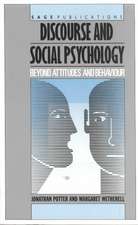Discursive Psychology: Inquiries in Social Construction series
Autor Derek Edwards, Jonathan Potteren Limba Engleză Paperback – 7 apr 1992
Reframing fundamental issues of language and mind as social practices realized in discourse, Discursive Psychology offers a profound challenge to existing orthodoxies while also establishing an exciting new agenda in the social and human sciences.
Preț: 437.63 lei
Preț vechi: 514.86 lei
-15% Nou
Puncte Express: 656
Preț estimativ în valută:
83.74€ • 87.67$ • 69.29£
83.74€ • 87.67$ • 69.29£
Carte tipărită la comandă
Livrare economică 07-21 aprilie
Preluare comenzi: 021 569.72.76
Specificații
ISBN-13: 9780803984431
ISBN-10: 080398443X
Pagini: 208
Ilustrații: black & white illustrations
Dimensiuni: 138 x 216 x 12 mm
Greutate: 0.27 kg
Ediția:1
Editura: SAGE Publications
Colecția Sage Publications Ltd
Seria Inquiries in Social Construction series
Locul publicării:London, United Kingdom
ISBN-10: 080398443X
Pagini: 208
Ilustrații: black & white illustrations
Dimensiuni: 138 x 216 x 12 mm
Greutate: 0.27 kg
Ediția:1
Editura: SAGE Publications
Colecția Sage Publications Ltd
Seria Inquiries in Social Construction series
Locul publicării:London, United Kingdom
Recenzii
`Edwards and Potter present some fine analyses of people's everyday discursive work of remembering and of the attribution of motives, by which a powerful critique of laboratory studies of memory and attribution is provided... the book offers attractive examples of discourse analysis' - Discourse & Society`In this study, Edwards and Potter make a systematic attempt to make clear the nature, scope and methods of discursive psychology, the (final?) descendant of the revolution against na[um]ive empiricism and positivist metaphysics of the behaviourist tradition... It is evident from the publication of this and other first-class offerings from the Loughborough "stable" that our hopes for a truly scientific psychology now have some chance of being fulfilled' - Rom Harr[ac]e, British Journal of Psychology
`This book is a persuasive account of the insights that discourse analysis can provide, and the benefits of the discursive approach. It is well written and researched. The discussion of other psychological, sociological and linguistic perspectives, and the discursive analyses of memories and attributions, should provoke the interest of a wide range of social scientists... [It] makes a significant contribution to the promotion of this important approach' - Journal of Community & Applied Social Psychology
`This book is a persuasive account of the insights that discourse analysis can provide, and the benefits of the discursive approach. It is well written and researched. The discussion of other psychological, sociological and linguistic perspectives, and the discursive analyses of memories and attributions, should provoke the interest of a wide range of social scientists... [It] makes a significant contribution to the promotion of this important approach' - Journal of Community & Applied Social Psychology
Cuprins
Introduction
The Social and the Cognitive
Ulric Neisser's Memory
Chancellor Lawson's Memory
Texts, Descriptions and Inferences
Description as Attribution
World-Making and Self-Making
Discursive Psychology
The Social and the Cognitive
Ulric Neisser's Memory
Chancellor Lawson's Memory
Texts, Descriptions and Inferences
Description as Attribution
World-Making and Self-Making
Discursive Psychology
Notă biografică
Derek Edwards is Reader in Discursive Psychology in the Department of Social Sciences, Loughborough University. He is co-author (with Neil Mercer) of Common Knowledge, (with Jonathan Potter) of Discursive Psychology and (with others) of Ideological Dilemmas.
Descriere
This accessible text introduces the key elements of a discursive approach to psychology. This focuses on how discourse - naturally occurring talk and text - can be studied and understood as the accomplishment of social action. Building on discourse analysis, the authors present an integrated discursive action model which leads to a radical reworking of some of psychology's most central concepts - language, cognition, truth, knowledge and reality.
The implications of a discursive perspective for such topics are explored alongside a sustained argument against the perceptual-cognitivist emphasis that currently dominates psychology. A particular theme is the reconceptualization of memory and attribution. The authors exam



























